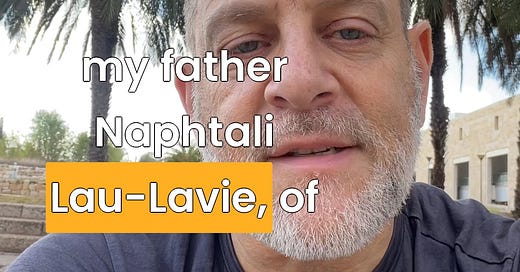Playback speed
×
Share post
Share post at current time
Share from 0:00
0:00
/
0:00
Transcript
My Father's Hidden Homage to the Sabbath Queen
Weekly Vid Recap of Below the Bible Belt
Dec 13, 2024
On this Shabbat, as the full moon of Kislev lights the winter sky, my family marks ten years since my father, Naphtali Lau-Lavie, of blessed memory, died. In his honor I want to share a memory that is both a blessing and a question.
Did my father worship the Goddess known as Wisdom, or the Sabbath Queen?
Every Friday night at our home, we’d gather in the living room after returning from the synagogue. Most often it was my father, my older brothers and me , who would walk to the nearby synagogue for evening prayers while my mother and sister stayed at home to finish the preparation for the shabbat meal.
By the time we all gathered in the living room, candles lit, all of us dressed in our sabbath best, a pile of the weekend newspapers on the coffee table, alongside fresh flowers — my father would clear his throat, and begin recitation of the sabbath evening hymns.
First we’d sing Shalom Aleichem, the welcome song to the sabbath angels - each verse three times as is the custom. Always the same tune.
And then we’d sing Eshet Chayil — the alphabetical hymn which is in the final chapter or Mishlei- Proverbs. It is one of only 3 or 4 chapters in the entire Hebrew Bible that I still know by heart.
Eshet Chayil is a mystery shrouded in secrets and often misunderstood.
It is sung to HER - the source of wisdom who speaks to us throughout this book of proverbs that are meant to wake us up from sleepwalking through life and called upon to commit to lives of virtue.
But when I was growing up - -and this is true for many many households still today — the song was sung and seen as a praise poem to the matriarch - the woman of the house whose labor is rarely recognized and whose efforts have provided us with a clean home and cooked meal for the sabbath. It became a song of validation for the mother when it was originally a hymn to The Mother of All.
The thing is — in our home, although the song was sung from the first to the last verse in the same sing-song melody that many of us still use today — it was done while my father was also reading the weekend paper, multitasking with mindless ease. My brothers did the same, while often my mother was still making sure that everything was ready on the table.
I remember, as a little kid, how much that upset me.
If we are sitting and singing a song to praise my mother - why is nobody looking up from the paper while mumbling and why is she still running around?
My early feminist revolt did not make much of an impression. This was just the way things were.
My father, in his own unique way, loved tradition, carried it throughout his life, as he learned from his parents in Poland, a Holocaust survivor proud of our ways and not too engaged with the deeper meanings of why we do things or what it’s really all about. Tradition and continuity mattered most.
It took me many years, as an adult, to figure out that the mystical sages who introduced this final chapter of Proverbs as a hymn to the Sabbath Queen chose to bring the goddess into our homes — but in disguise.
Yes, we are singing to the mother of the home who until recent times was the only ones entrusted with the domestic duties — but at the same time we are praying to and praising the ancient Deity of Wisdom and Compassion, She Who is All Things — right at the heart of the patriarchal male-led religion, and still and always the most central symbol of our faith and family life.
In many homes, including those of my mother and my siblings, the same tune we sang when Abba was alive is sung - and when I will gather with my family in Israel this Friday night we will most likely sing it from the first to the last verse, with or without glancing at the headlines.
But at least some of us already know that what we do is to continue worship of the Wisdom Goddess AKA the Sabbath Queen deep within our hearts and homes. I love the radical layers even if not everybody is on board.
So did my father worship the Wisdom Goddess? Yes and no. She who is so many faces is within the love that radiates within tradition, waiting for the moment to shine above and beyond.
With this reflection and hymn we start to say goodbye to Lady Wisdom. Next week we have just three more chapters of Proverbs, including the final one that contains Eshet Chayl.
And then we enter the Land of Oz and meet Job and his trial of faith and trauma.
But Wisdom will not go away so soon - we’ll find her right there in the Book of Job — the source of the divine intention and the way to realize the form and function of the world.
May the memories of our beloved ancestors bring blessing to us all, with smiles and recognition, always. May Her Wisdom shine within and beyond.
Thank you for joining me below the Bible Belt.
Long live the Sabbath Queen!
Shabbat Shalom.
Recent Posts












Share this post